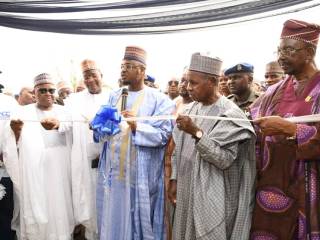...Centre'll help in fighting insurgency - Masari
The Hon. Minister of Communications, Dr. Isa Ali Pantami, has emphasised the commitment of the Federal Government to actively leverage Information and Communication Technology (ICT) to fight insecurity and improve safety of lives and properties in the country.
The Minister affirmed this during the commission of the first Emergency Communications Centre (ECC) and launch of the emergency call number 112 in Katsina State on Monday, September 23, 2019. The commission marked the beginning of the commissioning of other ECCs all over the Federation and the Federal Capital Territory (FCT), Abuja, where calls to the 112 emergency number will terminate and routed appropriately.
The ECC projects which are being implemented by the Nigerian Communications Commission (NCC) with counterpart support of respective state governments was conceived to enhance the security of lives and property of Nigerian people.
Pantami, who commended the Governor of Katsina, His Excellency, Rt. Hon. Aminu Bello Masari, for his efforts in fighting insurgency in the state, said the Federal Government under President Muhammad Buhari is very much focused on the three agenda of fighting insecurity, corruption, and improving the economy. The Minister stated that "our commissioning of the ECC first in Katsina, is the home state of the President is in demonstration of our loyalty to him and a commitment by the Ministry through the NCC to use technology to support his three-points agenda, as I earlier said."
The Honourable Minister said the centre will also be used to curb corruption through the integration of whistle-blowing communication process into the facilities.
In his remarks at the event, Governor Masari commended the Ministry for the initiative. He stressed that the project will help to complement the efforts of the State Government towards fighting insurgency and all forms of criminal activities in the state and subsequently help to improve the creation of a peaceful and enabling environment for economic and social activities.
Addressing a large gathering of audience at the commissioning ceremony, the Chairman, NCC Board of Commissioners, Otunba Olabiyi Durojaiye, amplified the voice of the Minister by restating that the commissioning of the ECC was "in line with President Muhammadu Buhari’s vision to enhance security of lives and property of Nigerians, particularly at this time the Federal Government is concerned about fighting insurgency, kidnapping, as well as mitigating road accidents, fire outbreaks or any other life-threatening occurrences in the country."
Durojaiye noted that "while successive governments had made various efforts at different times towards achieving this important ECC project, we are happy that its actual implementation is coming to reality under the current Board of the NCC through the support of Mr. President and the various state governments."
In his address, the Executive Vice Chairman (EVC) of NCC, Prof. Umar Danbatta, said it is common knowledge that security of lives and property is a prerequisite for progress in any society, hence the need for the NCC to embark on the project as enshrined in the Nigerian Communications Act, 2003.
Prof. Danbatta said, just as in the United States where the ‘911’ emergency service number is instituted and operational, the NCC has created the '112' as "our own national emergency number for the security of lives and property of our people."
"Hence, the ECC is a one-stop shop by which members of the public can dial '112' from their phone using any mobile network to access help from any response agency such as the Police, the Federal Road Safety Commission (FRSC), the Nigerian Security and Civil Defence Corps (NSCDC), Fire and Ambulance Services, National Emergency Management Agency (NEMA)" he said.
According to the EVC, the ECC is equipped with facilities such as eleven workstations, a server system that receives and processes 112-calls from members of the public and then dispatches the calls to the appropriate agency that has responsibility to attend to the specific emergency. The Centre also has public power supply from the national grid, and six dispatch workstations for the response agencies.
Danbatta further told the audience, comprising senior officials of the Commission, the Ministry, Katsina State government, representatives of security and emergency agencies that 17 states and the FCT have functional ECCs and they would soon be commissioned.
The states are Kastina, Ogun, Kano, Plateau, Anambra, Enugu, Kaduna, Benue, Akwa Ibom, Cross River, Oyo, Edo, Ondo, Ekiti, Kwara, Adamawa and Imo states.

